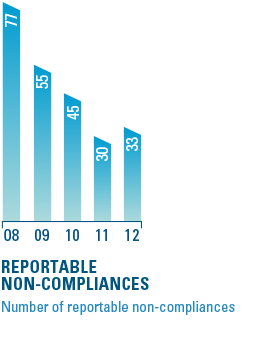Environmental Management is a serious issue at BlueScope. Our communities are our homes and our health, safety, environment and community responsibilities are integral to the way we do business. We value our environmental permits and licenses to operate as contracts with the community that enable us to manufacture steel products.


All of BlueScope’s sites and business have Environment Management Systems, consistent with the corporate framework, which you can read about here.
FOSTERING AND PROMOTING A CULTURE OF CONTINUAL IMPROVEMENT
BlueScope's environmental objectives go beyond compliance. Our aim is that our environmental performance will exceed government imposed requirements.
We have a record of environmental improvement stretching back many years. All of our operations have been involved in working to improve our environmental performance.
BlueScope has developed a suite of targets for the environment which are designed to drive long term improvement in the Company’s environmental performance and have been fully integrated into BlueScope's business planning processes. All of our businesses have been charged with setting their own short and medium term environmental objectives as part of their business planning processes.
CAPITAL INVESTMENT TO MAINTAIN AND IMPROVE OUR EQUIPMENT AND FACILITIES
Steelmaking is a capital intensive process, with continued reinvestment required to ensure that assets remain efficient, competitive and productive. BlueScope also makes a significant financial investment to improve our environmental performance. We have invested more than $600 million in environmental improvements in the last 20 years, and continue to spend around $50 million per year on operation and maintenance of pollution control equipment.
Read more about BlueScope’s most recent environmental investments here.
Legislative Compliance
 In FY2012, BlueScope notified relevant Australian authorities of 33 incidents resulting in statutory non-compliances with environmental licensing requirements. During the period, there were no serious environmental incidents, and the major restructuring of the Australian operations was completed successfully.
In FY2012, BlueScope notified relevant Australian authorities of 33 incidents resulting in statutory non-compliances with environmental licensing requirements. During the period, there were no serious environmental incidents, and the major restructuring of the Australian operations was completed successfully.
Only one incident resulted in a penalty. An air discharge incident occurred at the Port Kembla Basic Oxygen Steelmaking (BOS) plant in February 2012 resulting in two fines of $1500 each, issued in March 2012.
Over the last five years the number of statutory non-compliances has been reduced by over fifty percent.
